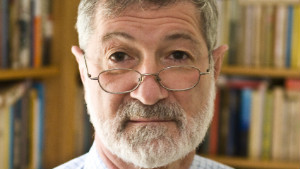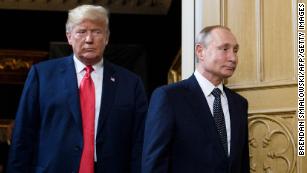Sheer luck has helped us avoid nuclear war so far -- now we need to take action
Updated 12:47 PM ET, Sat November 17, 2018
Sheer luck has helped us avoid nuclear war so far -- now we need to take action
Updated 12:47 PM ET, Sat November 17, 2018
Ira Helfand, a medical doctor, is a member of the international steering group of the International Campaign to Abolish Nuclear Weapons, the recipient of last year's Nobel Peace Prize. He is also co-president of the International Physicians for the Prevention of Nuclear War, the founding partner organization of ICAN and itself the recipient of the 1985 Nobel Peace Prize. The opinions expressed in this commentary are solely those of the author.
(CNN)The 100th anniversary of the World War I armistice last weekend underscored the great folly of President Donald Trump's threat to pull out of the Intermediate-Range Nuclear Forces Treaty with Russia. President Vladimir Putin's response that "there would be nothing left except an arms race" shows our world leaders have failed to learn from history.

Ira Helfand
The Great War, also known as "the war to end all wars," engulfed an unwitting world because the leaders of the great powers did not understand the enormity of suffering they were about to unleash when they stumbled needlessly into conflict.
Today, Trump, Putin and other leaders pursue their nuclear policies with a similar disregard for the potentially catastrophic effects. They plot their moves as if they were playing a game of global chess. But nuclear weapons are not chess pieces, and nuclear war will certainly not be a board game. War involving today's nuclear arsenals would be a disaster beyond our imagining.
And that may be the root of the problem we face: We literally cannot imagine how destructive nuclear weapons are. Our defense policies treat them like ordinary weapons, and we seek the security of bigger arsenals to ensure our enemies' fear of the nuclear unknown is greater than ours.
For much of human history, a bigger stockpile, or more advanced weapons, granted a greater advantage in combat. But nuclear weapons should be understood as suicide bombs. Even the "successful" use of our own nuclear weapons against an enemy that doesn't fire back could potentially destroy the world as we know it.
Recent studies have shown that even a conflict between smaller nuclear powers such as India and Pakistan could trigger dire consequences. If just a fraction of the world's nuclear weapons (say, 100 bombs the size of the one dropped in Hiroshima) were deployed on urban industrial targets, the resulting fires would put enough soot into the upper atmosphere to cause climate disruption. This could then lead to a global famine that would place up to 2 billion people at risk of starvation, according to one study.
There are enough weapons on board a single US Trident submarine to trigger this kind of catastrophe many times over. To put this into context, the United States has 14 of these submarines as well as land-based missiles and a fleet of long-range bombers. All told, the United States has 6,550 warheads -- most of which are 10 to 50 times more powerful than the Hiroshima bomb -- with about 1,350, or 1 in 5, deployed and ready to use.
There is no conceivable security benefit from having more of these weapons, nor do we need to worry if Russia has more than we do. Astronomer Carl Sagan compared the arms race between the United States and Russia to two men "standing waist deep in gasoline; one with three matches, the other with five." We all understood how crazy this was, but that is exactly how our current leaders think about nuclear arsenals.
Far from protecting us, nuclear weapons are, in fact, the greatest threat to our security. There have been several instances during the Cold War when either Washington or Moscow began the process of launching their nuclear arsenals in the mistaken belief they were under attack by the other side. Each time, in former Defense Secretary Robert McNamara's words, "We lucked out." Current nuclear policy is little more than hope for continued luck. Pulling out of the INF treaty will only increase the odds that our luck runs out sooner rather than later as the United States, Russia and perhaps China field new nuclear weapons instead of working to eliminate those they already possess.
Last year, 122 nations called for a dramatically different approach and voted to adopt a new Treaty on the Prohibition of Nuclear Weapons. Here in the United States, a national grassroots campaign, Back from the Brink, is calling for the US government to embrace this treaty.
You received this message because you are subscribed to the Google Groups "MAPA Nuclear Disarmament" group.
To unsubscribe from this group and stop receiving emails from it, send an email to mapa-nuclear-disarmament+unsubscribe@googlegroups.com.
To post to this group, send email to mapa-nuclear-disarmament@googlegroups.com.
To view this discussion on the web visit https://groups.google.com/d/msgid/mapa-nuclear-disarmament/03fc01d47f98%24257702a0%24706507e0%24%40texnology.com.
For more options, visit https://groups.google.com/d/optout.




